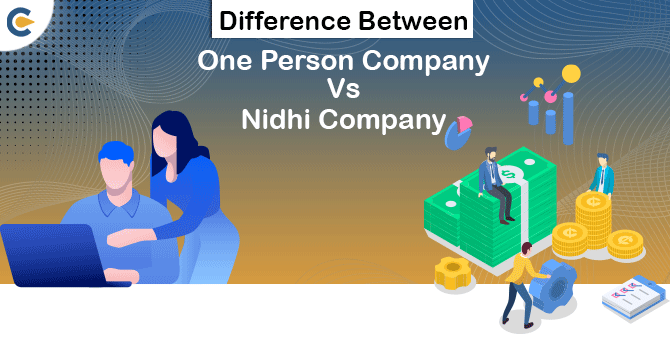According to the Companies Act 2013, the novel concept of One Person Company (OPC) has emerged in response to the ever-changing business landscape. It is a cross between a sole proprietorship and a corporation. Although the concept of entrepreneurship is new in India, it would take time for people to accept it. There is a need to give one person or a group of young entrepreneurs complete freedom to participate in economic activity. This article is thus an attempt to comprehend the concept of opportunities and challenges associated with OPC in India.
The advent of this concept has opened up new economic opportunities and stunning possibilities for sole owners and entrepreneurs, as they can now enjoy the benefits of limited liability. OPC in India will open up new doors for small business owners. It is a private limited company that is registered by one person with limited liabilities.
There are two ways a One Person Company can be incorporated in India:
- Company limited by guarantee.
- Company limited by shares.
A company limited by shares is required to have a minimum paid-up share capital of INR 1 lakh. It cannot transfer its shares and cannot urge the public to subscribe for the company’s share.
A One Person Company should include OPC after the company name. The member of a one-person company must nominate a nominee with written consent, which must be filed with the company’s registrar. Following notification to ROC (Registrar of Companies), an OPC member can modify the nominee.
Dr. J J Irani’s Expert Committee Report (2005) on OPC in India
The notion of a One Person Company or OPC in India has already been implemented in many nations under various names. This type of corporation is commonly referred to as a ‘Single Member Company.’ Liechtenstein, for example, was the world’s first corporation where the notion of a ‘Single Member Company’ was legally recognised.
In India, the Jamshed Jiji Irani Committee proposed that the legislation to recognise the potential for diversifying the forms of corporations in India, rather than keeping to the existing ones.
For the first time ever, the Committee suggested that the legislation should recognise the creation of a “One Person Company,” which is an economic organisation composed solely of one person. According to the report, a simplified regime may be offered to such a business by exclusions, so that the sole entrepreneur is not forced to waste time, energy, and resources on procedural problems. The 8th of August, 2013 is remembered as a watershed moment in the history of Corporate India. As on this day, both the houses passed the much-needed new and contemporary laws related to companies. The Companies Bill, 2012, was notified in the Gazette of India on August 30, 2013, after gaining the assent of the Honorable President of India.
Features of the One Person Company:
The following are some of the attractive features of OPC in India:
- An OPC in India is a corporation which has only one person as a member, and all the legal as well as financial liabilities are limited to the company only and that person is not personally liable.
- It can be incorporated only as a private company, and it is a private company for all legal purposes, all the benefits that are available to Private Limited Companies are applicable to One Person Companies, such as access to credits, bank loans, limited liability, legal protection for business and access to market, etc. all with a separate legal identity.
- One person company can have only one director, although it can have up to fifteen directors.
- It is mandatory to appoint a nominee.
- The words “one person company” must be mentioned after the company’s name.
- An OPC is exempt from holding general and Board meetings if the company has only one director.
- The Registrar of Companies should be informed about every contract entered into.
OPC as a Private Company
Because One Person Company has been granted the status of a private company, it must comply with the regulations that apply to a private company, with a few exceptions, to ease its compliance burden comparatively. Examples of these exclusions include:
- According to Section 2(40) of the Companies Act of 2013, which states that an OPC is not required to prepare a cash flow statement as part of a financial statement;
- Proviso to Section 92(1) states that an OPC is not required to appoint a Company Secretary, as the annual return can be signed by the company’s director;
- According to Section 96(1) of the Companies Act, 2013, OPCs in Inia are not required to hold mandatory Annual General Meetings (AGM);
- Several provisions of the Companies Act 2013, such as the power of the Tribunal to call meetings of members, etc., are not applicable on the OPCs in India;
- Calling of the extraordinary general meeting as per Section 100 of the Companies Act of 2013;
- Notice of meeting as per Section 101 of the Companies Act of 2013;
- Statement to be annexed to notice as per Section 102 of the Companies Act of 2013;
- The quorum for meetings as per Section 103 of the Companies Act of 2013;
- Chairman of meetings as per Section 104 of the Companies Act of 2013;
- Proxies as per Section 105 of the Companies Act of 2013;
- Restriction on voting rights as per Section 106 of the Companies Act of 2013;
- Voting by show of hands as per Section 107 of the Companies Act of 2013;
- Voting through electronic means as per Section 108 of the Companies Act of 2013;
- Demand for the poll as per Section 109 of the Companies Act of 2013;
- Postal ballot as per Section 110 of the Companies Act of 2013;
- Circulation of members’ resolution as per Section 111 of the Companies Act of 2013.
The Salient Features of OPC in India
An OPC in India may only be incorporated by a natural person who is a resident of India or an Indian citizen.
(Explanation: A person who has lived in India for at least 182 days in the immediately prior calendar year is referred to as a resident in India.’)
In the event of the original shareholder’s death or incapacity, the Shareholder shall propose another individual to become a shareholder. Such nominee shall give their consent and such consent for being designated as the sole Shareholder’s Nominee. A One Person Company may only have one nominee who is a natural person, an Indian citizen, and a resident of India. A minimum of one director is required; the sole shareholder may be the sole director. The maximum number of directors for the Company is 15.
What Is the Concept of Nominee for A OPC in India
As per the provision of Section 3(1)(c) of the Companies Act of 2013 at the time of incorporating the One Person Company the member must appoint a nominee. The Nominee appointed will become an active member in the following two cases:
- In the event of the death of the member
- At the time when member becoming incapacitated to contract.
Who Cannot Become a Member of an OPC or A Nominee in OPC
The following person cannot be a member or a nominee of an OPC in India:
- A minor.
- A Foreign citizen.
- A non-resident of India.
- A person who is incapacitated to contract.
- A person or an individual who is not a natural person.
What Is The Process For Nominating A Nominee?
An OPC member must obtain written consent from the person they intend to designate as a nominee. The name of the nominee must be included in the Memorandum of Association (MOA). The nomination must be filed with the company’s Registrar (ROC) in form INC 2, together with the written consent in form INC 2 with the appropriate fee. Also, it is necessary to have a permanent account number.
Circumstances for Change of Nominee
A nominee can be changes in the following 3 conditions:
- Change of the nominee by the member
- OPC has all the power to change the nominee at any time by writing a notice to the member.
- After this OPC must nominate a new nominee within a period of 30 days and obtain their consent for the same.
- Death or incapacity of the member.
- In case of death/incapacity of the current member the nominee will become the member of the OPC.
- After this the new member has to nominate a new nominee within 15 days from becoming the member.
- Nominee himself wants to withdraw his name.
- Nominee can withdraw the consent to be a nominee by giving a notice to the OPC
- OPC must nominate a new nominee within a period of 30 days from the date of such withdrawal.
Privileges and Exemptions Available To OPC in India
OPC in India will create more opportunities for small entrepreneurs because it demands less cash and legal compliance. Any foreign company can readily approach one person company to start the venture without any delay in its legal proceedings through a merger or joint venture. It is a low-risk enterprise. It gives young entrepreneurs a fresh perspective on starting a firm. It combines the advantages of both the single proprietorship and the corporation.
In comparison to other commercial operations, legal formalities are minimal. Auditor rotation is not required after the maximum period has expired. The requirements of Section 98 and Section 100 to Section 111 (both inclusive) relating to general meetings do not apply to a One Person Company. According to Section 92 of the Companies Act, the 2013 annual return must be signed by the Company Secretary or, if there is no Company Secretary, by the company’s director. The OPC is not obligated to prepare a cash flow statement. There is less paperwork.
On the other hand, OPC in India has several downsides. An individual may not integrate more than one OPC. OPC cannot be incorporated or turned into a non-profit corporation. It is not permitted to engage in any non-financial activities.
An OPC cannot voluntarily convert into any other type of company until two years have passed from the date of incorporation, except in the case where the threshold limit (paid-up share capital) is increased above INR 50 Lakhs or its average annual turnover during the relevant time surpasses INR 2 Crores. When compared to a sole proprietorship, the compliance cost is higher. With that, a Private Limited Company that already exists cannot be converted into an OPC.
Though OPC appears to be a viable kind of company, there is still a long way to go because, in India, the mindset of sole traders is more conventional, and they usually do not want to shift from the way they have been doing business.
Why A One Person Company Is Effective, And Why Choose It?
One-person businesses provide new opportunities for entrepreneurs. An OPC is a great place to start for those curious about new things and wanting to take on new challenges. Unlike other types of businesses, there is no need for a board of directors.
There is a conflict of opinion over decision-making when the board of directors consists of at least two persons. However, there is no such conflict in a one-person company because the director is also the company’s shareholder and owner. A shareholder in a one-person company only has to cover limited liability, which is why the notion of a one-person company is far more evolved than that of a sole proprietorship business.
Conclusion
The Companies Act of 2013[1] resolves some of the significant flaws in the Companies Act of 1956. It makes major revisions to provisions relating to governance, e-management, compliance and enforcement, disclosure and norms, auditors, and mergers and acquisitions. It also introduces new concepts, such as one-person corporations.
With the introduction of OPC as a business model, the government’s responsibility to meet people’s job needs is somewhat reduced, and it also highlights the dynamic nature of the New Companies Act.
Read Our Article: How One Can Start One-Person Company In India?











